| Srl | Item |
| 1 |
ID:
158886
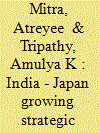

|
|
|
|
|
| Summary/Abstract |
The Indo-Japanese low intensity relationship has undergone a remarkable turnaround in the new millennium – acquiring a new dimension focused on mutual security and strategic interests. This article analyses the new phase of improved India- Japan bilateral relations and explores this emerging trends that contributes towards cementing the strategic relations between the two democracies.
|
|
|
|
|
|
|
|
|
|
|
|
|
|
|
|
| 2 |
ID:
135467


|
|
|
|
|
| Summary/Abstract |
The UPA government had a broad approach to India’s emergence as a regional and global power but has never articulated it in terms of a strategy. In essence, it is to delay some of the instruments of power projection while India achieves economic development and growth with balance, in an effort to uplift all the Indian people. The focus of this policy is on the welfare of the people and consequent benefits of political consolidation, while not unduly constraining the reforms and growth needed to pay for them. Prominent risks to the strategy include the interlocking problems of security and governance.
|
|
|
|
|
|
|
|
|
|
|
|
|
|
|
|
| 3 |
ID:
156568


|
|
|
|
|
| Summary/Abstract |
India’s Nuclear policy was in essence Nehru’s policy. In practice, Nehru was responsible for burgeoning economic situation in India. He saw development of the peaceful uses of nuclear power as the emerging scientific means to overcome abject poverty.
|
|
|
|
|
|
|
|
|
|
|
|
|
|
|
|
| 4 |
ID:
133911
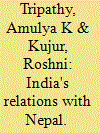

|
|
|
|
|
| Publication |
2014.
|
| Summary/Abstract |
It can be safely concluded that external powers have more to do in Nepali domestic politics, than Nepalis themselves do. It is unlikely that Nepal would have a smooth sail in the near future. With the intensifying contentions, both overt and covert, between and among China, the US and India, Nepal's politics can hardly be expected to have a democratic regime in the years to come. The things will become stable once the present cat-and-dog contention in the Himalayan Asia reaches saturation and a conclusive end. Timeframe and modus operandi for that cannot be predicted, for various variables could differ the state of affairs. It is US and China's interest to control the region.
|
|
|
|
|
|
|
|
|
|
|
|
|
|
|
|
| 5 |
ID:
161791
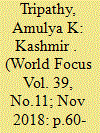

|
|
|
|
|
| Summary/Abstract |
The peace-process is complicated and determined by the terrorist activities of Muslim separatist groups working in Jammu and Kashmir. As long as this terrorism is not removed totally, peace between the two countries is a distant dream. 2019 will witness another General Election.
|
|
|
|
|
|
|
|
|
|
|
|
|
|
|
|
| 6 |
ID:
158128


|
|
|
|
|
| Summary/Abstract |
The Princely State of Jammu and Kashmir comprises the Kashmir valley, Jammu, Poonch, the remote dependencies of Gilgit, Baluchistan and the isolated province of Ladakh or “Little Tibut.”1 Their size and area almost matched the total area of England, Wales and Scotland.2At the time of partition, about 90% of the valley’s population was Muslims.
|
|
|
|
|
|
|
|
|
|
|
|
|
|
|
|
| 7 |
ID:
169807
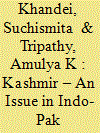

|
|
|
|
|
| Summary/Abstract |
The present history of Kashmir begins with the Treaty of Lahore of8 March 1846, which settled the British conquest of the Sikh Empire.1 The Sikhs had preceded the British in a line of conquerors of the region, and a Dogra chieftain, Ghulab Singh, had been made ruler of Jammu in reward for his services to the Sikh Maharaja Ranjit Singh. By 1839, Ghulab Singh had wrested the territories of Baluchistan and Ladakh from Tibet, thus extending Dogra rule northward and eastward from Jammu.
|
|
|
|
|
|
|
|
|
|
|
|
|
|
|
|
| 8 |
ID:
123418


|
|
|
| 9 |
ID:
116097
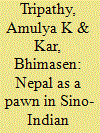

|
|
|
| 10 |
ID:
157374
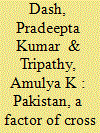

|
|
|
|
|
| Summary/Abstract |
Cross-border terrorism has emerged as a great threat to the security of India. Terrorism originating from across the border has slowly attempted to strangle the democracy and sovereignty of India.
|
|
|
|
|
|
|
|
|
|
|
|
|
|
|
|
| 11 |
ID:
150602


|
|
|
|
|
| Summary/Abstract |
Terrorism and Islamism are age-old ideas in the philosophy of world politics but with the 9/11 attack the idea of ‘radical Islam’ emerged in the lexicon of analysis of the linkage between terrorism and Islamism. The prevalent and common practice is to understand the linkage from a religious point of view or from a civilizational point of view. However to the student of world politics the more attractive approach to ponder over is that of strategic analysis. This paper takes such a non-religious view to understand the linkage between international terrorism and radical Islam in the 21st century.
|
|
|
|
|
|
|
|
|
|
|
|
|
|
|
|